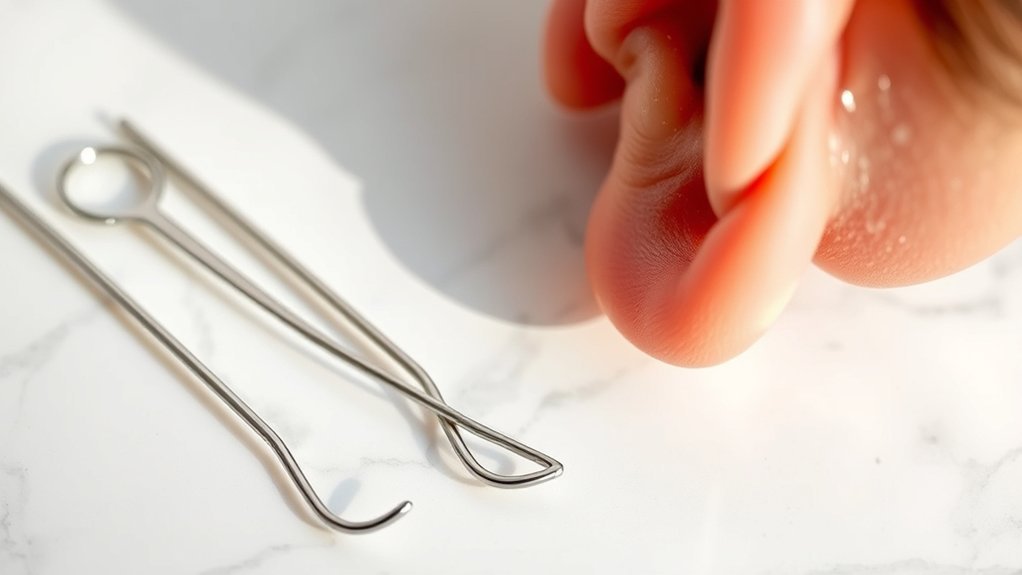You might not realize that earwax plays an essential role in protecting your ears. Despite common beliefs, cleaning your ears too often can actually do more harm than good. Many people rely on cotton swabs, unaware they might be pushing wax deeper into the canal. Understanding the facts about ear cleaning can help you maintain better ear health. So, what are the safe practices you should follow?
Common Myths About Ear Cleaning
While many people believe that frequent ear cleaning is essential for good hygiene, several myths can lead to improper practices.
One common myth is that using cotton swabs is an effective way to remove earwax. In reality, cotton swabs often push wax deeper into the ear canal, potentially causing blockages or injury.
Another misconception is that clean ears equal healthy ears; however, over-cleaning can strip the ear canal of its natural protective oils, leading to irritation.
Additionally, some think that earwax is gross and needs to be eliminated entirely, but it actually serves important functions, like protecting the ear from dirt and bacteria.
Understanding these myths can help you maintain proper ear care without harming your ear health.
The Role of Earwax in Ear Health
Earwax plays a significant role in maintaining ear health, contrary to the belief that it should be completely removed. This natural substance, known as cerumen, protects your ears by trapping dust, debris, and microorganisms, preventing them from reaching the eardrum.
It also acts as a lubricant, keeping your ear canals moist and reducing the risk of irritation or infection. Additionally, earwax has antibacterial properties that help maintain a healthy ear environment.
Your body produces earwax in just the right amount, so excessive cleaning can disrupt this balance, leading to dryness and potential complications. Understanding earwax’s protective functions can help you appreciate its importance and avoid unnecessary removal practices that could harm your ear health.
Safe Ear Cleaning Techniques
When it comes to maintaining ear hygiene, using safe ear cleaning techniques is crucial to avoid potential damage.
Start by using a damp cloth to clean the outer ear; this method is gentle and effective. If you notice a significant build-up of earwax, consider using over-the-counter ear drops designed to soften wax.
Avoid inserting cotton swabs or any objects into your ear canal, as this can push wax deeper or injure the ear. If you experience discomfort or excessive wax, consult a healthcare professional.
Regular check-ups can help maintain ear health and guarantee your cleaning practices are effective. Remember, less is often more when it comes to ear cleaning, so prioritize safe methods.
Risks of Improper Ear Cleaning
Improper ear cleaning can lead to a range of risks that may compromise your ear health. Using cotton swabs or other objects can push wax deeper into the ear canal, causing blockages. This can result in hearing loss, discomfort, or even infections. Additionally, excessive cleaning can irritate the skin of the ear canal, leading to inflammation. Here’s a quick overview of the risks associated with improper ear cleaning:
| Risk | Description | Consequence |
|---|---|---|
| Wax Impaction | Pushing wax deeper into the ear | Hearing loss |
| Infection | Introducing bacteria into the ear | Pain, discharge |
| Skin Irritation | Overcleaning irritates ear canal | Inflammation |
| Perforated Eardrum | Using sharp objects | Severe pain, hearing issues |
| Tinnitus | Damage to inner ear | Persistent ringing sensation |
When to Seek Professional Help
Recognizing the signs that warrant professional help is essential for maintaining ear health. If you experience any of the following symptoms, don’t hesitate to consult an audiologist or healthcare provider:
Recognizing symptoms that require professional help is crucial for preserving your ear health. Seek assistance when in doubt.
- Persistent Pain: If you have ongoing ear pain that doesn’t improve with over-the-counter medication, it’s time to seek help.
- Hearing Loss: Sudden or gradual hearing loss can indicate underlying issues that need evaluation.
- Discharge or Bleeding: Any unusual discharge or bleeding from the ear should prompt immediate professional attention.
Ignoring these signs can lead to complications, so it’s best to err on the side of caution.
Regular check-ups can also guarantee your ears stay healthy and free from problems.
Frequently Asked Questions
Can Earwax Removal Improve Hearing Ability?
Yes, earwax removal can improve hearing ability. When excess wax accumulates, it can block sound waves. By safely removing it, you often regain clearer hearing and overall ear health, enhancing your auditory experience.
Is It Safe to Use Cotton Swabs for Ear Cleaning?
Using cotton swabs for ear cleaning is like trying to paint a masterpiece with a broom—it’s risky. They can push wax deeper, leading to blockages or injury. It’s safer to let your ears clean themselves naturally.
How Often Should I Clean My Ears?
You should clean your ears only when necessary—typically every few weeks or as needed. Avoid over-cleaning, as it can irritate your ear canal and disrupt natural wax production, which protects your ears.
Are There Natural Remedies for Ear Cleaning?
Yes, there are natural remedies for ear cleaning. You can use a mixture of warm olive oil or mineral oil to soften earwax. Just apply a few drops, let it sit, then gently wipe the outer ear.
Can Ear Cleaning Help With Ear Infections?
Ear cleaning won’t directly help with ear infections. Instead, it can sometimes worsen the situation. You should focus on proper medical treatment and consult a healthcare professional for effective solutions to your ear infection concerns.
Conclusion
In the journey to maintain ear health, don’t let myths steer you off course. Embrace the natural armor that earwax provides, and remember that less is often more when it comes to cleaning. Treat your ears with care—like delicate instruments—and opt for safe techniques to avoid any unwanted complications. Should you ever find yourself in doubt, don’t hesitate to consult a professional. Your ears deserve the best, so listen to them wisely.
